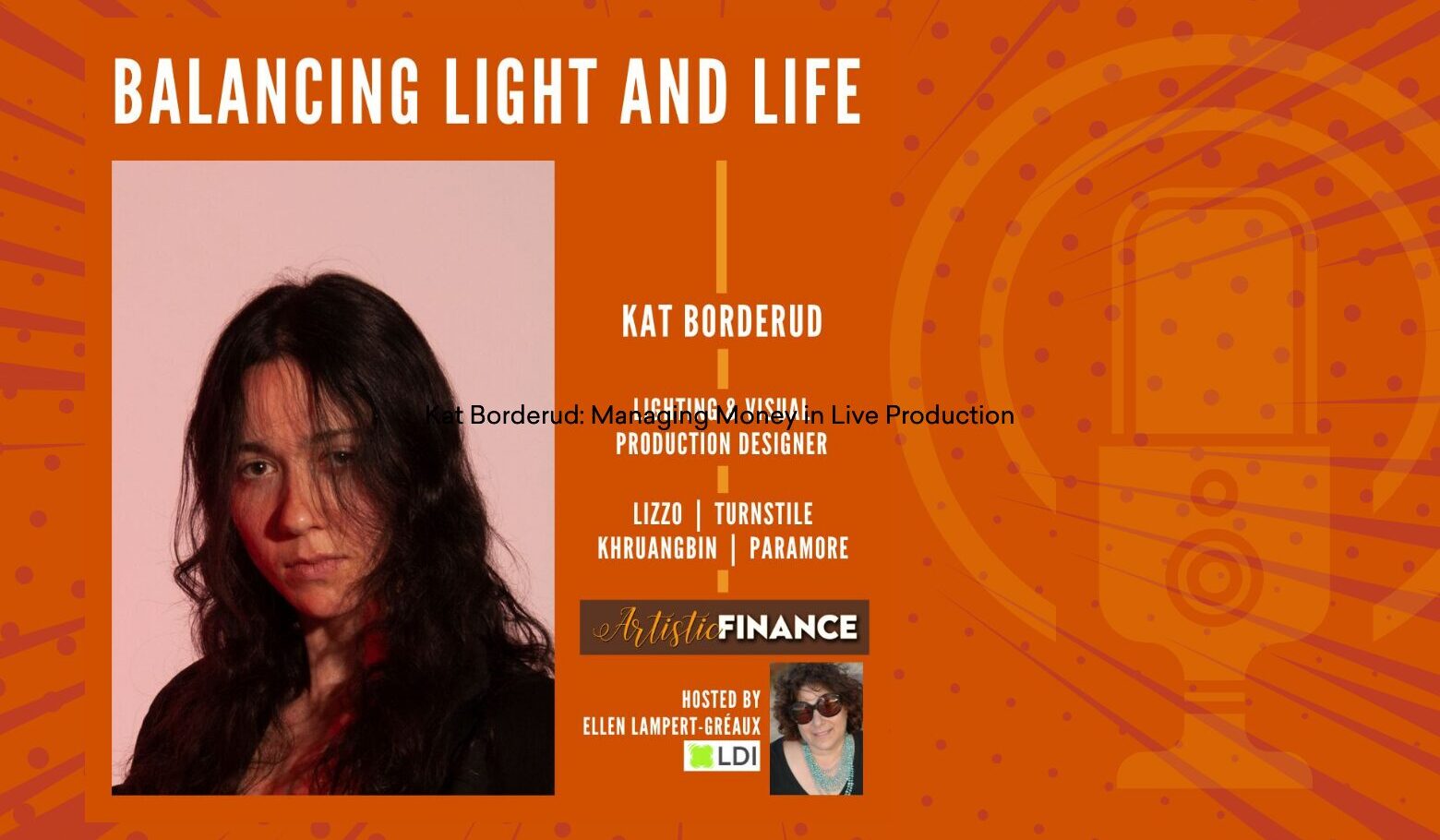Kat Borderud: Managing Money in Live Production

In this Artistic Finance Podcast Episode, lighting and visual production designer Kat Borderud sits down with Ellen and Ethan to talk about handling finances as a touring LD and programmer. Below is an insight into some of the topics covered in this Podcast.
How do you manage finances as a freelancer in the live production industry?
Managing finances as a freelancer is a learning experience. Since I work both on payroll and as an independent contractor, I have to adapt constantly. I’ve learned to balance between high-paying jobs and passion projects. Some gigs offer full payroll, while others require invoicing and waiting for payments. It’s essential to keep track of invoices, follow up on payments, and ensure a steady cash flow. I also maintain a balance between spending and saving, considering long-term financial security while staying adaptable to the industry’s fluctuating nature.
How do you determine your rates and negotiate pay?
My rates ebb and flow depending on the client and project. Some jobs have budgets that allow me to charge my full rate, while others are passion-driven, working with artists I love, sometimes at a lower rate. The key is to balance financial needs with career growth and artistic fulfillment. I’ve learned that negotiating upfront is crucial—sometimes there’s pushback when I request more, but that’s part of the process. If an agreement can’t be reached, I’ve also learned it’s okay to walk away from a project rather than undervalue my work.
What financial challenges have you encountered, and how do you handle them?
One major challenge is waiting for payments. Freelancers often have to chase invoices, and some clients delay payments for months. I stay on top of my invoicing and always follow up. Another challenge was navigating finances during the pandemic when touring halted. I had to quickly pivot, apply for unemployment, and cut expenses. Another big financial step was buying a house—committing to a mortgage made me rethink my financial planning, ensuring my income could sustain long-term commitments while still allowing flexibility for slow work periods.
How do you plan for financial stability and retirement as a freelancer?
I don’t have a 401(k) or Roth IRA yet, but I’ve started thinking about long-term financial security. My house purchase was a step in that direction—real estate is an asset that grows over time. I also explore different financial strategies, such as setting up an LLC or S-Corp for tax benefits. I seek advice from peers and professionals and use budgeting tools like Excel spreadsheets and Rocket Money. Having an accountant who specializes in freelance finances has also been invaluable.
What role does networking play in career and financial growth?
Kat Borderud: Networking is everything in this industry. Opportunities come from relationships with other creatives, production teams, and industry leaders. I’ve had many people support me in my career, and I’m committed to paying it forward. I actively mentor women and non-binary individuals in the lighting and production industry, advocating for gender equality in technical roles. Connecting with vendors and working in rental shops is also crucial—learning the technical aspects of rigging, cabling, and programming enhances job prospects. Attending industry events like LDI is a great way to meet potential collaborators and find new opportunities.
Key Takeaways from the Episode
- Money is energy—it flows based on how you manage it and invest in yourself.
- Balancing passion projects with financially lucrative gigs is essential for sustainable freelancing.
- Advocating for fair pay and setting financial boundaries ensures long-term career success.
- Investing in assets like real estate and considering retirement plans are vital for financial stability.
- Networking and mentorship help build a strong, supportive industry community.
Listen to this Episode on:
Website / Spotify / Apple Podcasts / YouTube
This episode of the Artistic Finance podcast is hosted by Ellen Lampert-Gréaux & Ethan Steimel.
Back to Home
Editor's Note: At StageLync, an international platform for the performing arts, we celebrate the diversity of our writers' backgrounds. We recognize and support their choice to use either American or British English in their articles, respecting their individual preferences and origins. This policy allows us to embrace a wide range of linguistic expressions, enriching our content and reflecting the global nature of our community.
🎧 Join us on the StageLync Podcast for inspiring stories from the world of performing arts! Tune in to hear from the creative minds who bring magic to life, both onstage and behind the scenes. 🎙️ 👉 Listen now!